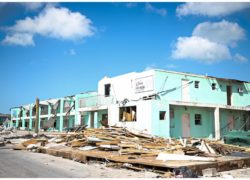
Five hundred million dollars is what local insurance companies expect to churn out in the aftermath of Hurricane Dorian and that’s a conservative figure, according to Bahamas Insurance Association (BIA).
That figure, according to Timothy Ingraham, of Summit Insurance, is just going off of what was paid out after Hurricane Matthew in 2016.
During a press briefing yesterday at the BIA, Mr. Ingraham acknowledged that it was based on initial photos of the devastation of Hurricane Dorian, which, he said, is possibly a bigger event that Hurricane Matthew.
However, during that press conference, the BIA acknowledged that although $500 million is an exorbitant figure, which may spark some degree of concern, particularly following a recent press release by A.M Best Insurance Rating Organization – a premiere international credit rating firm – advising that credit rating for several insurers in The Bahamas are under review, the Chairman of BIA, Warren Rolle, said there is no reason for concern as local insurance companies are committed to meeting contractual obligations to clients.
“This is the modus operandi of A.M Best following any major disaster as they are required to provide objective commentary on any material development that may lead to a rating downgrade,” Mr. Rolle said.
“In fact, even the largest insurance or reinsurance company in the world are occasionally subject to this review status.
“As the release indicates, there are robust reinsurance programmes in place, which are vetted by the industry’s regulator, Insurance Commission of The Bahamas, to ensure that there are adequate protections in place to cover the risk that we assume.
“We again wish to reassure our clients that the A.M Best release in no way impedes affects the industry’s financial wherewithal to pay clients, which every effort will be made to settle fairly and expeditiously.”
The BIA also acknowledged that all insurance companies are aware of the risks faced, particularly living in a Hurricane zone and companies ensure that its reassurances programmes are robust enough to withstand hurricanes and claims thereafter.
The association and its members are, however, warning its clients to be careful of outside or international adjusters who may come into the country and offer assistance for settling claims.
Mr. Ingraham said these adjusters may pose an issue as sometimes international insurers may not understand The Bahamas’ policy conditions, which he said leads to a protracted process.
“In fact, the claims where they get involved tend to be the ones that take a bit longer to settle because we find that they are over inflated. We find that there are things in there that are not covered by our policy, but may be covered by a policy in their (international agencies) jurisdiction,” Mr. Ingraham said.
“So, talk to your insurance company first before you decide whether you need to contact anyone else.
“Most of the time when you contact someone else to assist you with your claim, especially those that come across our borders, be aware that they will have a significant fee which they take from your insurance settlement to do what they do.
“So, we just want our policy holders [to] go into this with your eyes open.”


